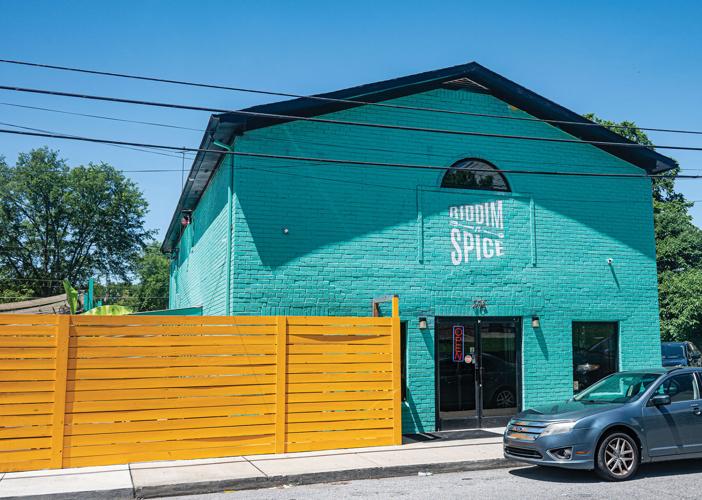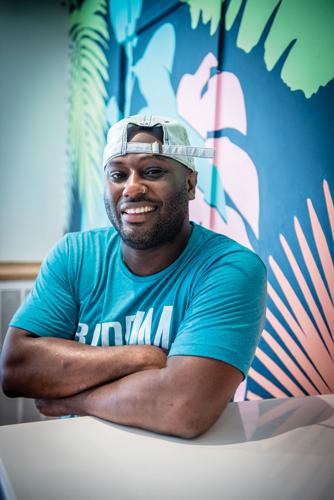“It doesn’t make any sense,” says Rashean Conaway. He’s sitting on a couch above Riddim n Spice, the North Nashville Jamaican restaurant and bar he co-owns with his brother, chef Kamal Kalokoh. It’s almost lunchtime.
There are two ways each brother could finish that sentence.
It doesn’t make sense to run a restaurant that doesn’t make money. That’s the current financial situation facing Riddim n Spice, which opened five years ago a block off Jefferson Street. Conaway says they’ve agreed on August as a make-or-break point. If business doesn’t pick up significantly, they’ll close. If he were a more sane person, Kalokoh says, they would have closed a long time ago.
Both brothers talk about the restaurant as a daily gamble. They bet on Caribbean food, excellent service and a supportive community hungry for a new, updated space with local Black ownership.
Their ingredients were promising. Kalokoh grew up in the kitchen learning from his mother, the chef-owner of longtime Nashville staple Jamaicaway. Summers with his grandparents in Jamaica helped refine his palate. As a young chef in 2011, he won over Drake with a plate of food when the rapper came to Nashville. He joined Drake and Rihanna for tours in the U.S. and Europe in 2011 and 2012. Around that time, Kalokoh brought on his brother, the more business-minded of the two with a knack for logistics, to help him handle the constant hotel hopping.

Kamal Kalokoh
Kalokoh and Conaway started Riddim n Spice as a food truck in 2013 before eyeing a brick-and-mortar location on Meharry Boulevard in 2017. They raised money, renovated and remodeled, and opened the restaurant in 2019. The bright, seafoam-green facade sticks out on a quiet residential block behind Meharry Medical School. They added an outdoor patio and built out the Rum Room, an upstairs bar. Conaway milled the hardwood tables from salvaged pecan and black walnut trees that fell in the neighborhood. Most new development around here, in the historic heart of Nashville’s Black community, comes in blocks of high-end condos replacing aging buildings or single-family homes.
“I feel like maybe because we’re Black-owned, people don’t want the food,” says Conaway, weighing the impact of new white residents who bring more money to the neighborhood. “Or don’t want to come in here because they don’t know what to expect. We are clean, we have a liquor license, we have excellent service, we are approachable, we are a block away — what other reason could there be? Do I need to put white people on the website for you to feel comfortable walking down your own street to come to this restaurant?”
Conaway, who has a graduate degree in urban environmental planning and worked in affordable housing development before coming to the restaurant, saw the pieces of a neighborhood on the rise. He and his brother want to help push North Nashville upward after decades of economic decline without handing over property, power and money to white ownership.
“The funny thing is, amongst the Black community, everyone talks about how there’s nothing to do here for us,” says Kalokoh. “There’s no good Black soul food restaurants, or places you can dance, places where you won’t get shot up. But there actually are — you just don’t go. You’ve heard about it, but you go somewhere else in Germantown, Salemtown, the Gulch, anywhere else. What I’m hoping for is more Black people from other cities keep moving here and visiting these places, because that’s the only way for Black bars, Black nightlife, Black spots to survive.”
With Kalokoh’s top-flight culinary résumé and Conaway’s business sense, it doesn’t make sense to them why the restaurant isn’t full during the day and the bar isn’t packed on weekends. They survive on special events, a business bump during Black History Month, catering gigs and orders around Juneteenth. Beyoncé’s Cowboy Carter has led to a noticeable uptick in Black tourism, Kalokoh says, but the backbone of a restaurant — steady sales, a few dozen more customers at lunch, a patio that’s even half-full during happy hour — has failed to materialize. He’s heard the same dire stories from Black restaurant owners across the city, especially after the society-wide push to shop at Black-owned businesses peaked in 2021.
“Black Nashville, especially youth, they’re proud of being from here — I see it,” says Kalokoh. “But there’s a little bit of delusion, too. If you really want it to be dope, you have to come to these restaurants, go to these art showings — everything that’s Black, you got to be there. If not, it’s just over. Black extinction in Nashville.”





